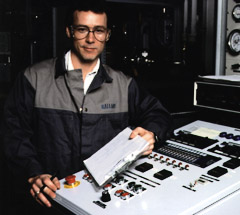 |
Fuel cell technology has many applications, and offers numerous
ecological advantages. In a fuel cell, hydrogen and oxygen combine
to produce electricity, and the process's only by-product is water.
Bill works as a Test Technologist with other members of Ballard's
Stationary Stack Engineering Group to develop "Power Plants".
Connected cells called "stacks" can provide energy for anything
from homes to household appliances, and from hospitals to cars.
High production
costs affect fuel cell viability, despite its proven value and
effectiveness. As Bill explains, his job is to change this fact.
"Making fuel cells practical is the big push right now. The majority
of my job is to bring costs down by implementing new, cheaper
materials."
Bill tests
fuel cells in a lab, using "test stations" to control the operating
variables of the hydrogen and oxygen gases that energize the fuel
cell. Roughly the size of a large refrigerator, these test stations
"control temperature, pressure, flow rate, flow velocity, and
the humidity of the gases that go into the stack." The test station
can emulate the conditions that a stack works in, or determine
which conditions are required to get the best energy results.
Bill collaborates
with other team members, reporting test results either formally
in a report, or via discussion. He also plays an active role in
the redesign phase of the project. Working at Ballard Power Systems
suits Bill perfectly. "I really like what I do, I love being out
in the lab, I love testing. I get a real thrill out of the new
products. There's a bit of an adrenaline high."
|
 |


